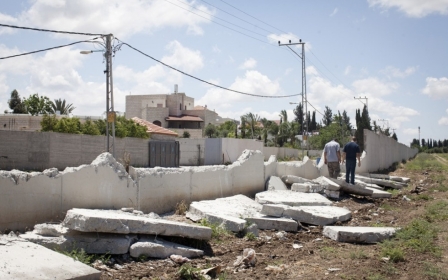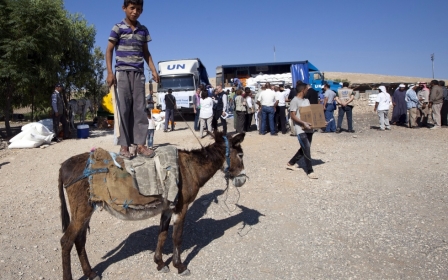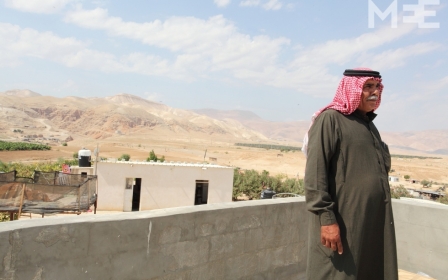Legal experts condemn Israel’s planned transfer of Bedouin as potential war crime

Leading experts in international law, anthropology and planning have condemned Israel’s threatened forced transfer of thousands of Bedouin in the occupied West Bank as a violation of international humanitarian law and a potential “war crime".
The experts called for the prosecution of Israeli officials who are responsible for implementing plans to relocate as many as 12,500 Bedouin to a centralised township near Jericho, called Nweima, to make way for new Israeli settlements.
It is one of several sites proposed by the Israeli authorities for the relocation of some 30,000 pastoralist Bedouin people. The plan has sparked international concern for the plight of the Bedouin and condemnation from world leaders.
The Palestinian Jahalin Bedouin communities reside mostly between Jerusalem and Jericho in the occupied West Bank’s Area C, where the Israeli army controls security and planning and has carried out many demolitions of Bedouin homes and schools over recent decades.
The Bedouin originally lived in the Negev desert but fled or were pushed out during the creation of Israel in 1948.
The experts’ statement follows Palestine’s formal joining of the ICC earlier this month in a move that would allow them to lodge war crime complaints against Israel as of April.
Speaking at a symposium of experts in Jericho near Jerusalem on Thursday, Marco Sassoli, professor of international law at the University of Geneva said: "The forcible transfer of a person within occupied territory is a violation of the Fourth Geneva Convention. Israel has to stop it. All states have an obligation to ensure respect for that prohibition. Forcible transfer within an occupied territory also constitutes a war crime.
He added that Israel and all other state parties to the convention must prosecute individuals suspected of such a crime. “In line with the recent statement of the prosecutor at the International Criminal Court (ICC), considering Palestine as a state party to the statute of the ICC, she may bring persons suspected of such a crime before the ICC, if the Israeli justice system tolerates forcible transfers."
Dawn Chatty, professor of anthropology and forced migration at Oxford University, condemned the planned relocation as a form of cultural genocide and ethnic cleansing, arguing that “the Israeli transfer plan in the West Bank threatens the Bedouins’ need for mobility and user rights over extensive but low-quality natural resources such as grazing lands. The plan could be seen as cultural genocide of the Bedouin way of life in the West Bank. The sweeping nature of the forced eviction is tantamount to ethnic cleansing."
The experts called on Israel to cease all measures and plans that would lead to the transfer, displacement and further dispossession of the Bedouin, and instead to put in place policies that support the welfare of the Bedouin communities, which is the obligation of an “occupying power” and to stop the construction and expansion of settlements in the occupied Palestinian territory.
Abu Suleiman, speaking on behalf of the Bedouin Protection Committee in the West Bank, told the meeting that “the Bedouin totally reject this plan which will have an unbearable human impact on our families. Women, children, the elderly, some of the most vulnerable people in the Middle East will suffer intolerably. What we are facing is the elimination of the traditional way of life of an entire indigenous population. The transfer plan must be abandoned."
Angela Godfrey-Goldstein, a Israel-based film producer and activist who campaigns on behalf of the West Bank Bedouin, told MEE that the UK and other Western governments had a direct responsibility for their fate.
“The British abstention [in the December UN security council recognition vote on Palestinian statehood] is really bad for the Bedouin because it has endorsed the status quo. Israel has elections coming up in March and that has strengthened the right wing – in a way it is a vote for Likud. It is not challenging them, it is not putting pressure on them."
Godfrey-Goldstein pointed to a recent interview with former Israeli prime minister Ehud Barak in which he said: “In all of the years in which I was in government with Netanyahu, when the question was raised ‘what’s the damage?’ Bibi asked in response, ‘What’s so bad in the meantime? There’s no boycott, there’s no violence, … we’re succeeding in holding up the ceiling, in holding up the walls, nothing is collapsing, we’re continuing to sail on, the prophecies aren’t coming true and we are terrific."
New MEE newsletter: Jerusalem Dispatch
Sign up to get the latest insights and analysis on Israel-Palestine, alongside Turkey Unpacked and other MEE newsletters
Middle East Eye delivers independent and unrivalled coverage and analysis of the Middle East, North Africa and beyond. To learn more about republishing this content and the associated fees, please fill out this form. More about MEE can be found here.




